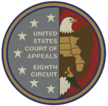Citizens for Equal Protection v. Bruning
| Citizens for Equal Protection v. Bruning | |
|---|---|
 |
|
| Court | United States Court of Appeals for the Eighth Circuit |
| Full case name | Citizens for Equal Protection et al., v. Jon Bruning, Attorney General of Nebraska et al. |
| Decided | July 14, 2006 |
| Citation(s) | 290 F.Supp.2d 1004 (D.Neb. 2003) 455 F.3d 859 (8th Cir. 2006) |
| Case history | |
| Prior action(s) | Judge Joseph F. Bataillon, D.Neb., granted judgment for plaintiffs on stipulated trial, struck down Nebraska Initiative Measure 416 as unconstitutional violation of Equal Protection, First Amendment, and bill of attainder |
| Case opinions | |
| [1] | |
| Court membership | |
| Judge(s) sitting | Chief Judge James B. Loken, Pasco Bowman II, Lavenski Smith |
| Keywords | |
| Initiative Measure 416, Marriage, Equal Protection, Same-sex marriage, Sexual Orientation | |
Citizens for Equal Protection v. Bruning, 455 F.3d 859 (8th Cir. 2006), was a federal lawsuit filed in the United States District Court for the District of Nebraska and decided on appeal by the United States Court of Appeals for the Eighth Circuit. It challenged the federal constitutionality of Nebraska Initiative Measure 416, a 2000 ballot initiative that amended the Nebraska Constitution to prohibit the recognition of same-sex marriages, civil unions, and other same-sex relationships.
On May 12, 2005, United States District Judge Joseph F. Bataillon ruled that Initiative Measure 416 violated the Equal Protection Clause of the Fourteenth Amendment and was a bill of attainder in violation of the Contract Clause of Article I. Nebraska Attorney General Jon Bruning appealed the decision to the Eighth Circuit in St. Louis, Missouri.
On July 14, 2006, the Eighth Circuit reversed Judge Bataillon's decision. It held that Initiative Measure 416 did not violate the Equal Protection Clause, was not a bill of attainder, and did not violate the First Amendment. The Eighth Circuit held that "laws limiting the state-recognized institution of marriage to heterosexual couples ... do not violate the Constitution of the United States." The plaintiffs did not appeal to the Supreme Court.
...
Wikipedia
